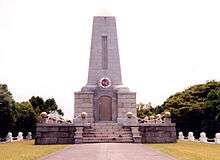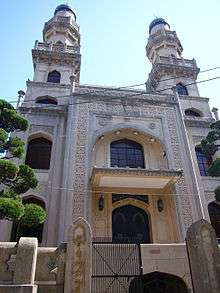Turks in Japan
Turks in Japan (Japanese: 在日トルコ人(ざいにちトルコじん); Turkish: Japonya Türkleri) are Turks living in Japan. Historically, the term has included Turkic (particularly Volga Tatar) émigrés and immigrants from former Russian Empire, most of whom later acquired Turkish citizenship.
| Total population | |
|---|---|
| 5,167(2017)[1] 8,152 (Registered in Turkish Embassy, 2017)[2] | |
| Languages | |
| Turkish · Japanese | |
Population figure given is for citizens of Turkey living in Japan. The Turkish Embassy gives a lower figure of 2,264 (2006); however, this counts only citizens who have voluntarily registered at the embassy.[3] |
History
In the early 20th century, groups of Tatars immigrated from Kazan, Russia, to Japan.[4] The community became led by the Bashkir émigré imam Muhammed-Gabdulkhay Kurbangaliev, who had fought on the side of the White movement in the Russian Civil War, and arrived in Japan in 1924; he then set up an organisation[fn 1] to bring together the Tatars living in Tokyo.[4] Tatars in Japan founded their first mosque and school in 1935 in Kobe, and another in Tokyo in 1938, with support from Kurbangaliev's organisation.[4][5] Another Tatar organisation, the Mohammedan Printing Office in Tokyo,[fn 2] printed the first Qur'an in Japan as well as a Tatar-language magazine in Arabic script, the Japan Intelligencer;[fn 3] it continued publication until the 1940s.[4] Most of the Tatars emigrated after World War II.[4] Those remaining took up Turkish citizenship in the 1950s.[3] But There are 600-2,000 Tatars in Japan.[6]They are almost mixed.[7]
Though the Turkish community has diminished in size, those remaining founded the Tokyo Camii and Turkish Cultural Center in 2000.[4][8] In the following decade, there was a new wave of migration from Turkey, mostly consisting of people from the Fatsa area.[9]
Some Turkish citizens in Japan are ethnic Kurds.[10]
In 2015 a clash took place outside the Turkish embassy in Tokyo between Kurds and Turks, it was claimed that this began when Turks and Kurds got into a quarrel after a Kurdish party flag was shown at the embassy.[11]
Prominent Turks (Volga Tatars) in Japan
- Osman Yusuf (a.k.a. Johnny Yuseph, 1920 - 1982): Actor
- Abdul Hannan Safa (a.k.a. Roy James, 1929 - 1982): Actor, naturalised in 1971
- Ömer Yusuf (a.k.a. Yusef Toruko ("Yusuf the Turk"), 1930 - 2013): Puroresu referee and actor, brother of Osman Yusuf
Gallery
 Memorial to the Turkish victims of the sunken ship in Japan
Memorial to the Turkish victims of the sunken ship in Japan Turks in Japan selling Dondurma
Turks in Japan selling Dondurma Turkish ice cream in Kyoto
Turkish ice cream in Kyoto
Footnotes
References
- 平成29年6月度 在留外国人
- Japonya'daki Türk Toplumu, 3.1.2017
- Japonya Türk Toplumu (Turkish People of Japan), Tokyo, Japan: Turkish Embassy, archived from the original on 2008-05-06, retrieved 2007-04-13
- Hayashi, Shunsuke (February 2010), "Yapon mohbiri – the sole magazine introducing Japan to Muslim countries of the world", National Diet Library Newsletter (171), retrieved 2010-09-07
- Kronoloji (Chronology), Tokyo, Japan: Turkish Embassy, archived from the original on 2007-05-18, retrieved 2007-04-13
- Представитель культурной ассоциации «Идель-Урал» считал, что количество татар в Японии в 1930-е годы могло достигать 10000 человек (in Russian)
- https://archive.today/20030624221109/http://islam3.hp.infoseek.co.jp/column/kurban1.htm
- A Brief History of the Tokyo Camii, Tokyo Camii and Turkish Cultural Center, retrieved 2010-09-07
- "Fatsalı'nın ikinci vatanı Japonya", Sabah (in Turkish), 2005-10-01, retrieved 2009-02-24
- Tsumura, Tadashi. "Japan's Kurds often in limbo, despite significant community". The Japan Times. Retrieved 2016-08-18.
- "Turks and Kurds clash in Japan over Turkey elections". Al Jazeera English. 2015-10-25. Retrieved 2016-08-18.
Further reading
- Usmanova, Larisa (2007), The Türk-Tatar diaspora in Northeast Asia: transformation of consciousness : a historical and sociological account between 1898 and the 1950s, Rakudasha, ISBN 978-4-9903822-0-9
- 松長 昭 [Matsunaga Akira] (2009), 在日タタール人―歴史に翻弄されたイスラーム教徒たち [Tatars in Japan: Muslims tossed on the waves of history], 東洋書店 [Тōyō Shoten], ISBN 978-4-88595-832-8
